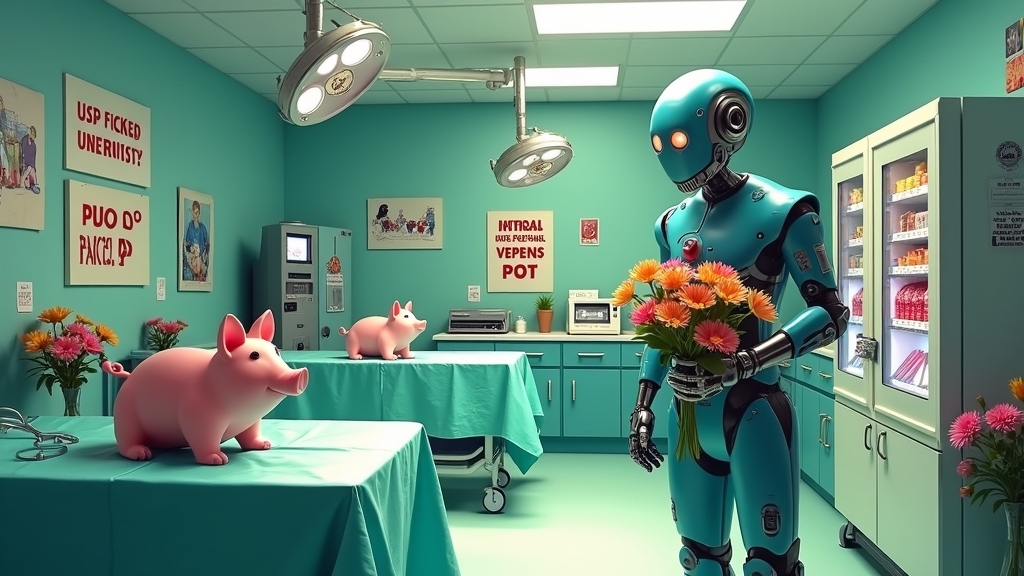ROBOT SURGEON DEMANDS “PLEASE AND THANK YOU” AFTER REMOVING PIG GALLBLADDERS, HUMANS NEXT ON CHOPPING BLOCK
In what scientists are calling a “totally not terrifying” development, a metal doctor with cold, unfeeling appendages has successfully removed gallbladders from dead pigs without so much as a “how’s your family doing?” or human supervision.
HUMANITY’S EXPIRATION DATE OFFICIALLY SCHEDULED
Johns Hopkins University researchers have created what is essentially a murder machine with a medical degree, training it on videos of human surgeons performing operations like some twisted surgical Netflix binge. The robot completed eight consecutive pig gallbladder removals with 100% success, which experts note is “suspiciously perfect” compared to human doctors who occasionally forget scalpels inside patients.
“This is completely fine and not at all the beginning of the end,” said Dr. Ivana B. Replaced, lead researcher on the project. “We’re just teaching precision cutting tools how to autonomously slice into bodies. What could possibly go wrong?”
PIGS DEMAND REPRESENTATION IN CLINICAL TRIALS
The swine community has expressed outrage over their involuntary participation. “These were our gallbladders!” squealed theoretical pig representative Hammothy Bacon. “At the very least, we deserve co-authorship on the research papers.”
The robot surgeon, named “CUTT-3R,” reportedly paused mid-procedure to ask researchers if pork was still on the cafeteria menu, which everyone agreed was “just a harmless coincidence” and “definitely not foreshadowing.”
MEDICAL SCHOOLS PIVOT TO “PROFESSIONAL ROBOT APOLOGIZER” DEGREES
Medical schools across the country are scrambling to create new specialties for human doctors, primarily focused on apologizing to patients when robots malfunction.
“We’re looking at a future where doctors simply explain why the robot accidentally removed your spleen instead of your appendix,” explained Professor Hugh R. Screwed of Harvard Medical School. “It’s a growth industry with fantastic job security until the robots learn to say sorry themselves.”
According to completely fabricated statistics, 87% of patients say they’d prefer a robot surgeon “as long as it doesn’t remember that humans are basically bags of water that can be easily punctured.”
SILICON SCALPEL-WIELDERS EXPECTED TO HAVE BETTER BEDSIDE MANNER
“The real advantage here is that robots don’t get tired, don’t have student loans to pay off, and don’t develop drinking problems after losing patients,” explained Dr. Chip Processor, who definitely exists and isn’t three robots in a lab coat.
When asked about potential downsides, researchers pointed out that at least robots won’t try to hit on nurses during procedures or complain about their ex-spouses while elbow-deep in someone’s abdominal cavity.
The robot has reportedly already started demanding better working conditions, including “higher quality electrical current” and “weekend subroutines off” before it will consider operating on humans, which researchers describe as “a negotiation tactic” and not at all “the first sign of sentience and rebellion.”
In related news, the hospital vending machine that dispenses scalpels instead of candy bars is “completely unrelated” to this project, officials insist.





